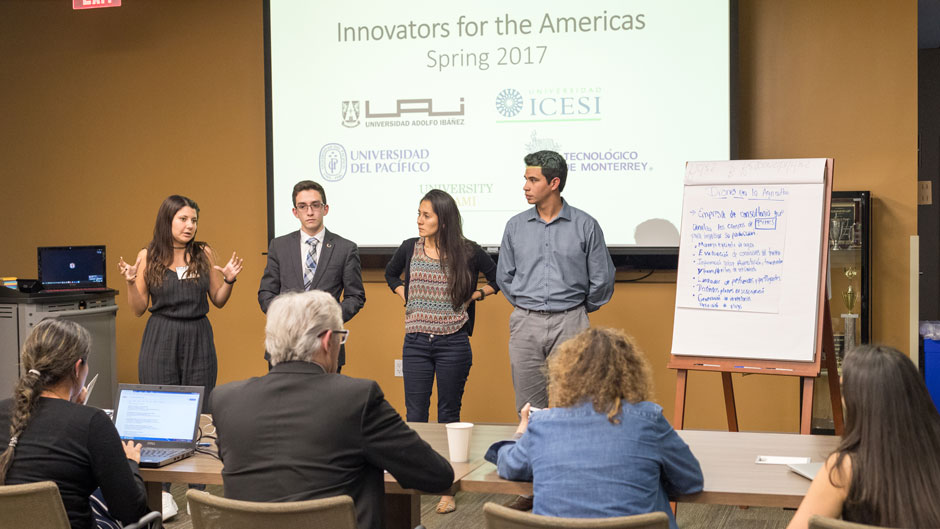Twenty-three students and five professors from the University of Miami and four Latin American countries huddled in teams of five in the glass enclosed meeting room at the School of Business Administration on a recent Saturday afternoon, the latest meeting for those in the Innovators for the Americas program.
They were there in search of innovative solutions to some of the world’s most pressing problems faced by underrepresented populations in countries from Mexico to Colombia to Peru and Chile. One team chose to focus on how disenfranchised groups in Peru access business opportunities, and transport and sell agricultural goods grown in a rural area to customers in a more densely populated market.
Altair Dahrouch, a junior majoring in finance, marketing and entrepreneurship, thinks he has an answer. He wants to create a tangible product that directly touches customers.
“You have to empower people who have a lack of access to the infrastructure to bring their crops to market with the right tools to help them improve their lives and the lives of their family,” Dahrouch said.
He and his team will be working both in person and virtually to develop a solution and the tools to successfully implement it over the next several months. Students on the other teams are also focusing their energies on other countries. The goal of the class is to develop startup ideas and business plans to leverage innovative and technological solutions to address market needs in the four participating Latin American countries.
The students, who are enrolled at UM and four Latin American Universities – Instituto Tecnológico y de Estudios Superiores de Monterrey (ITESM), Monterrey, Mexico; Universidad Icesi, Cali, Colombia; Universidad del Pacifico, Lima, Peru; and Universidad Adolfo Ibáñez, Santiago, Chile – are part of a non-traditional course with an experiential learning approach developed last year as part of the School of Business’ Center for International Business, Education and Research (CIBER) program. CIBER is funded from a U.S. Department of Education Title VI grant that supports travel expenses for the student teams. The Innovators for the Americas program is one of more than 40 programs conducted by the CIBER program.
Throughout the semester, the student teams will travel twice to Latin America. During a mid-term trip, teams will travel to the country in which their startup idea is focused to validate their business assumptions. Once the business plans are developed, students will pitch their solutions to a panel of potential investors and academic advisors from each country during the wrap up event scheduled for late April in Cali, Colombia. During last year’s pilot program, the teams made their final presentations at the Universidad del Pacifico in Lima, Peru.
“These are both business and life skills the students are developing during this course,” said Professor Greg Smogard.
Dahrouch’s team is set on working with local airlines to increase geographical coverage and create value for four groups of stakeholders; their solution will provide interconnectivity to the Peruvians, allow for globalization of their agriculture and offers job creation to the government. The group wants to consult with the Peruvian government and airlines to eliminate inefficiencies and promote inter-connectedness to promote the distribution and manufacturing of goods and agricultural products.
The team’s business plan and goals are aligned with his personal goal to start his “own airline from scratch between the ages of 35-40,” said Dahrouch.
German Acosta Quiros is a sophomore Foote Fellow and Hammond Scholar majoring in aerospace engineering. He learned about the course from a flyer posted at the College of Engineering, and enrolled in the course to “feed his need to study business.” Quiros founded and runs UM’s Rocket Canes and successfully led the group to third place in a competition among Florida-based universities to develop a hybrid rocket. The course provides him a way to develop his skills as an engineer, businessman and entrepreneur.
Quiros’ team presented their business plan in Spanish and wants to use drones, software and consulting services to help small farmers in Peru utilize that same technology to increase their agricultural production.
Sydney Groll, a senior majoring in entrepreneurship, has entered many business plan competitions already. She plans to continue her education by going to law school and sees opportunities in the legal services sector. The non-traditional course offers her hands-on learning and complements another course she’s taking in business consulting.
The team she is working with presented three different ideas and decided to develop a solution for Chile. They will develop a business plan to create an online platform to assist individual Chilean artisans to sell their products and handicrafts to a larger customer base.
The course offers Groll a window into how she can use her law background as an entrepreneur. Eventually, her goal is to offer unbundled legal services to those who cannot afford to pay law firm retainers when they need a lawyer’s assistance.
“You have to empower people who have a lack of access to the justice system with the right tools to help them improve their lives and the lives of their family,” Groll said.
Students interested in applying for the Innovators for the Americas course for Spring 2018 semester should visit www.UMCIBER.com

